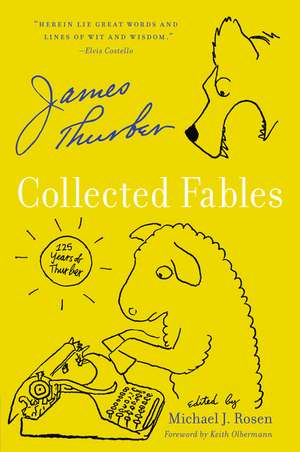Collected Fables
Autor James Thurberen Limba Engleză Paperback – 10 iun 2019
James Thurber has been called “one of the world’s greatest humorists” by Alistair Cooke (The Atlantic), and “one of our great American institutions” (Stanley Walker)—and few works reveal Thurber’s genius as powerfully as his fables. Perennially entertaining and astutely satirical, Thurber pinpricks the idiosyncrasies of life with verbal frivolity, hilarious insights, political shrewdness, and, of course, quirky, quotable morals.
Now, readers can savor 85 fables by the twentieth century’s preeminent humorist collected for the first time in a single anthology. Here, Fables for Our Time, Further Fables for Our Time, and ten previously uncollected fables—illustrated by ten contemporary artists including Seymour Chwast, Mark Ulriksen, Laurie Rosenwald, and R. O. Blechman—are presented in Collected Fables, a must-have for readers of all ages.
Preț: 96.65 lei
Nou
Puncte Express: 145
Preț estimativ în valută:
18.50€ • 19.24$ • 15.27£
18.50€ • 19.24$ • 15.27£
Carte indisponibilă temporar
Doresc să fiu notificat când acest titlu va fi disponibil:
Se trimite...
Preluare comenzi: 021 569.72.76
Specificații
ISBN-13: 9780062909176
ISBN-10: 0062909177
Pagini: 320
Dimensiuni: 135 x 203 x 18 mm
Greutate: 0.25 kg
Editura: HarperCollins Publishers
Colecția Harper Perennial Modern Classics
ISBN-10: 0062909177
Pagini: 320
Dimensiuni: 135 x 203 x 18 mm
Greutate: 0.25 kg
Editura: HarperCollins Publishers
Colecția Harper Perennial Modern Classics
Recenzii
“There is almost nothing of Thurber that doesn’t sing to me as clearly as if he were standing next to me asking why I have a tattoo from “The Moth And The Star.” But he was at his best when he set himself extraordinarily tight word limits, and these fables are the result: economical, surgical, and unforgettable.” — Keith Olbermann
“Herein lie great words and lines of wit and wisdom as might be read by a father to a son, or, for that matter, a mother to a father while a daughter stands with arms folded and a knowing look.” — Elvis Costello
“James Thurber taught me how to read. His pictures were so weirdly intriguing that I had to know more, so into the words I went, and things just got funnier. It’s one of the longest and most important relationships in my reading life.” — Michael McKean
"James Thurber was a comedic genius. His fables are not simply parodies of Aesop. They are wry, accurate, and powerful reflections of ourselves, our foibles, our follies, and, above all, our self-importance. And they are very, very funny." — Neil Gaiman
“Thurber’s genius was to make of our despair a humorous fable.” — John Updike, from Thurber: A Collection of Critical Essays
“These fables are as cogent and necessary today as they were before and after the Great War when Thurber’s plainspoken, satiric fables provided a way to speak out in an era of political suspiciousness, false hopes, and mistrust. These fables are, indeed, for our time.” — Michael J. Rosen, from the Introduction
“These tiny stories, in which a wide variety of animals show us how human we really are, are completely uproarious.” — Saturday Review of Literature
“[Thurber] is not only a Landmark in American Humor...in the combination of his prose and pictures he is the funniest artist who ever lived and wrote it too.” — New Republic
“Herein lie great words and lines of wit and wisdom as might be read by a father to a son, or, for that matter, a mother to a father while a daughter stands with arms folded and a knowing look.” — Elvis Costello
“James Thurber taught me how to read. His pictures were so weirdly intriguing that I had to know more, so into the words I went, and things just got funnier. It’s one of the longest and most important relationships in my reading life.” — Michael McKean
"James Thurber was a comedic genius. His fables are not simply parodies of Aesop. They are wry, accurate, and powerful reflections of ourselves, our foibles, our follies, and, above all, our self-importance. And they are very, very funny." — Neil Gaiman
“Thurber’s genius was to make of our despair a humorous fable.” — John Updike, from Thurber: A Collection of Critical Essays
“These fables are as cogent and necessary today as they were before and after the Great War when Thurber’s plainspoken, satiric fables provided a way to speak out in an era of political suspiciousness, false hopes, and mistrust. These fables are, indeed, for our time.” — Michael J. Rosen, from the Introduction
“These tiny stories, in which a wide variety of animals show us how human we really are, are completely uproarious.” — Saturday Review of Literature
“[Thurber] is not only a Landmark in American Humor...in the combination of his prose and pictures he is the funniest artist who ever lived and wrote it too.” — New Republic
Notă biografică
James Thurber was born in Columbus, Ohio, in 1894. Famous for his humorous writings and illustrations, he was a staff member of The New Yorker for more than thirty years. He died in 1961.
